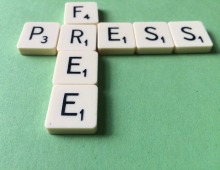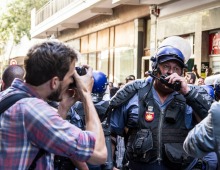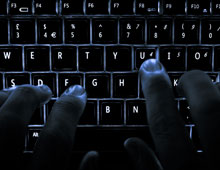The free press must fight back
The Craft
About this page
When we train journalists we give them the tools to understand this ‘axis of human striving’ and to understand their role in the creation of an ‘ethical society’.
Each month The Journalist will feature Mini Master Classes and articles in The Craft section. These online tutorials and opinion pieces are based on the experiences of renowned Journalists.
If you have ideas for topics you would like to see in The Craft section or need help with an area of Journalism, let us know. The Journalist has a team whose combined experiences cover digital media, print, broadcast and filmmaking. But ultimately we are seasoned Storytellers who would like to ensure that the next generation of media men and women do the South African story justice. Anything less is a human rights violation.
Tribute to Wiseman Khuzwayo
Waving farewell to the veteran journalist and activist
Women fighting their way to the top in community radio
Have female station managers broken through the glass ceiling?
SABC interim board announced
“Millions of South Africans rely on the public broadcaster”
Zuma and Trump: bullies who target freedom of the press
My Dear Americans. So very sorry to hear about your new president and the appalling way he’s treating you. I really, really feel your pain. But be of good cheer. You’re not alone. We, here in South Africa, know what it’s like to elect a paranoid, grandiose, delusional, narcissistic, demagogic and probably sociopathic president. Our version is Jacob Gedleyihlekisa Zuma — a corrupt, giggling, barely-educated Zulu polygamist worth some $215-million after a lifetime in various forms of politics,...
The lifeblood of the political beat
SONA in the media and the #SPHERE
Nonpartisan journalism in a Trump presidency?
Has model of neutral press been rendered inoperable?
The Media and Multiple forms of Racism
Moving away from apartheid era stereotypes
A tribute to Allister Sparks
Remembering the ‘media giant’
The truth and nothing but the truth
Re-affirming undercover journalism practices
Today is the International Day for Universal Access… So what?
“ensuring that the continent’s sunlight is strengthened and that information darkness becomes a thing of the past.”
Media Freedom and the #FeesMustFall movement
Catch-22 for student journalists
The radio station by the side of the river
Building local democracy in Upington
The historical factors that shaped local governance
Local Government in South Africa: Briefing Notes for Journalists: Part 2
Hlaudi, Jimi and freedom at the SABC
Tim Knight The Jimi Matthews who quit as the SABC’s acting Group Chief Executive was once a fierce and dedicated defender of freedom of the press. I knew him back around 1994 when the SABC lured me from Canada — where I’d been head of TV journalism training for the Canadian Broadcasting Corporation (CBC) — to coach its newsrooms in the ways of democratic journalism. My job was to lead a team of Canadian TV journalism trainers to help the SABC report professionally and honestly on the new...
Local Government in South Africa
Briefing Notes for Journalists: Part One
Watching the watchdogs
Surveillance: a threat to journalists and activists
Internet freedom: why access is becoming a human right
The Con When most people think or speak about internet freedom, they are often concerned with the right, for example, to say what you want online without censorship and without being subject to the chilling effects of surveillance. These kind of freedoms are sometimes called “negative freedoms” or “freedoms from…”. They address the right not to be interfered with or obstructed in living your life. But there are also “positive freedoms” — “freedoms to…” Some constitutions – notably the US...
Press freedom violations undermine African Union’s vision of transparency
The Con One key measure of a country’s levels of freedom and democracy is how the government treats journalists and how free they are to do their work. Sadly, based on a range of measures, including number of deaths, detention and government control of the media, the situation for journalists has worsened in the world. Three organisations monitor press freedom across the world. They are the Committee to Protect Journalists, Freedom House and Reporters without Borders. All use similar...
Panama Papers: the nuts and bolts of a massive international investigation
Professor of Journalism, Cardiff University
Veteran journalist joins Wits Journalism as adjunct professor
Veteran journalist, activist and Africanist Mathatha Tsedu is set to join Wits Journalism as an adjunct professor focusing on growing connections to the continent as well as tackling issues of transformation in South African media. Tsedu said that his two main priorities will be establishing exchange programmes for Wits Journalism students and academics with other journalism schools around Africa as well as transforming the curriculum by introducing “a more afro-centric and less euro-centered...
Further crackdown on media in Turkey
Concern over growing authoritarianism
Expanding the airwaves
The rise of community radio in post-apartheid South Africa
Mobiles that mobilised thousands of students
Pocket studios key in #FeesMustFall protests

About Us
The Journalist is a ground-breaking media project that provides history and context for key issues facing South African journalists. The Journalist is an independent, not for profit organisation working with the academic community and a range of credible online entities to make knowledge more accessible to the wider public. We don’t only tell you what happened. We help you understand why.
Our Partners
Republish Articles
We want our stories spread far and wide. Feel free to republish our articles, but please credit our writers and authors and credit The Journalist at the top or bottom of the article complete with a hyperlink back to the site.
Donate
The Journalist is a non-profit organisation and relies on public funding. Please consider donating to ensure more issues in the future.
Account name: The Journalist / Bank: Standard Bank
Branch Code: 026209 / Account number: 270320830




























